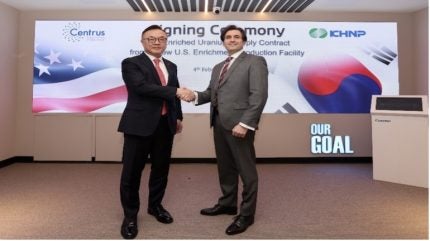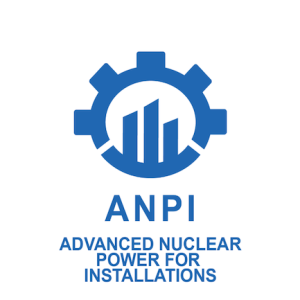
Korea Hydro & Nuclear Power has signed a 10-year enriched uranium supply contract with US-based nuclear fuel supplier Centrus Energy Corporation. A Memorandum of Understanding (MOU) between the two companies had been signed April 2023 outlining plans to enhance mutual cooperation for a stable fuel supply while exploring opportunities for expanding their businesses.
A Letter of Intent followed in February 2024 outlining substantive business objectives to enhance uranium resource security and nuclear cooperation between the companies. In September 2024, Centrus and KHNP announced the conditional commitment, which was formalised by the contract signed in Washington DC by Centrus President and CEO Amir Vexler and KHNP President and CEO Joo-ho Whang.
Centrus noted that the contract is contingent upon Centrus securing sufficient public and private financing to build low-enriched uranium (LEU) production capacity at its American Centrifuge Plant in Piketon, Ohio, and relates to 10-years of deliveries once the new capacity comes online.
In November 2024, Centrus said it would invest approximately an additional $60m over the next 18 months to lay the groundwork to support a potential large-scale expansion of uranium enrichment at its in Piketon. This large-scale expansion will require a multi-billion dollar public and private investment.
Centrus’s American Centrifuge technology is manufactured at its 440,000 square foot Technology & Manufacturing Centre in Oak Ridge and is supported by a US supply chain of 14 major suppliers with operations in at least 13 states plus dozens of other smaller suppliers but is not yet operating on a commercial scale. Currently, the only operating commercial uranium enrichment capacity in the USA is the Urenco USA (UUSA) plant at Eunice in New Mexico.
Other Western centrifuge enrichment plants currently operating commercially include Urenco’s other facilities in the Netherlands, Germany and the UK and Orano’s Georges Besse II plant in Tricastin, France. Orano is also looking to build a new centrifuge uranium enrichment facility in the US and has selected a preferred site in Oak Ridge. However, Russia remains the largest uranium enrichment supplier on the global market, which provided 35% of global enrichment in 2021 and is projected to provide 30% of global supply in 2035.
Business Korea noted that the agreement “marks a significant shift in South Korea’s nuclear fuel procurement strategy, aiming to reduce its dependency on Russian nuclear fuel amid rising geopolitical tensions”. From 2019 to 2023, South Korea imported approximately 1,947 tonnes of nuclear fuel, with 662 tonnes sourced from Russia. This reliance has become increasingly precarious due to the ongoing conflict in Ukraine and the growing trend of protectionism in global trade.
The contract with Centrus Energy is expected to significantly reduce KHNP’s dependence on Russian supplies. Although the specific volume of the contract was not disclosed, industry experts anticipate that the introduction of American low-enriched uranium will enhance resource security for both South Korea and the United States.
A KHNP representative emphasised the strategic importance of this agreement, stating, “The importance of securing resources in the international nuclear market has increased following the Russia-Ukraine war. The contract with Centrus not only strengthens resource security for both countries but also serves as a catalyst for closer US-South Korea nuclear cooperation.”
KHNP said the contract enables it to diversify its sources of enriched uranium for nuclear power generation, enhancing the stability of its fuel supply. “Notably, this contract represents the first tangible achievement of nuclear cooperation between the United States and Korea since the start of the Trump administration’s second term,” KHNP said. “As resource security becomes an increasingly critical issue in the global nuclear energy market, this contract is expected to foster deeper collaboration between the two nations – not only in securing energy resources but also in strengthening the nuclear fuel supply chain.”






